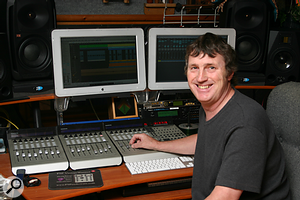We spend a lot of time discussing the finer (and less so) points of mastering, but what's it all about really? We're told that the art originated as part of the vinyl cutting engineer's duty and its primary aim was to eliminate any artifacts that might cause cutting problems — too much bass, for example, and the record player stylus could hop right out of the groove. Originally there was no attempt to 'improve' the sound of mixes — the idea seemed to be to make the song 'cutable'.
 Today the mastering engineer is an integral part of the creative process, but the very existence of such a person for anything other than the resolution of technical issues seems to be suggesting that a good mix still isn't good enough to put straight onto a record. And while vinyl might still be a popular medium with DJs, the CD is now the playback format of choice for consumers. When preparing material for CD, the technical requirements pretty much end at not allowing the signal to clonk into the end stop that is Digital Full Scale or 0dB — so what are these guys doing to our music, and why?
Today the mastering engineer is an integral part of the creative process, but the very existence of such a person for anything other than the resolution of technical issues seems to be suggesting that a good mix still isn't good enough to put straight onto a record. And while vinyl might still be a popular medium with DJs, the CD is now the playback format of choice for consumers. When preparing material for CD, the technical requirements pretty much end at not allowing the signal to clonk into the end stop that is Digital Full Scale or 0dB — so what are these guys doing to our music, and why?
One obvious reason for having music mastered is so that it can be listened to in a properly designed monitoring room over impeccable speakers where its true sound can be evaluated. If any problems are found, then the mastering engineer can bring to bear an armoury of high-class equalisers and dynamic processors to try to put things right. A typical problem is that a mix has either too much or too little bass because of the shortcomings of the control room and monitor system where the track was mixed. While some of the better professional studios have extremely good monitoring systems, few would claim that they are accurate enough for mastering — hence the need for a purpose-designed listening environment where qualitative judgements can be made and appropriate fixes applied. In the main, the mastering engineer has to make the material sound as good possible while also making it sound as loud as possible. But of course maximum loudness doesn't equate to maximum quality.
However, once the basic quality and loudness criteria have been met, perhaps one of the most important reasons for mastering is to make all the songs on an album sit well together, both in terms of level and overall timbre. This isn't simply a case of making sure each track is equally loud though, because that would make ballads seem too loud by comparison with rock songs, for example. Getting the right subjective balance is an art, so you have to go with a good pair of ears and instinct.
This being the case, what are we to make of systems that allow us to download individual tracks and then compile our own favourites album? If this becomes the standard model for music distribution in the future, one of the mastering engineer's most important tasks becomes irrelevant, as you never know which tracks are going to end up side by side on the end user's album — if they ever get as far as being burned onto a CD, that is! That leaves the mastering engineer with the unenviable task of trying to master each individual track in such a way that it can take on all comers, and while this could lead to greater consistency in some areas of mastering, I have a feeling that it will simply pour fuel on the loudness wars, as every client will want their track to sound louder than every other track that's available for download. And while radio stations have had to live with this scenario for many years, we all know the sonic damage their dynamic control devices do when trying to force all tracks to be the same subjective level!
It would be interesting to see what the mastering engineers out there make of this state of affairs.
Paul White Editor In Chief
